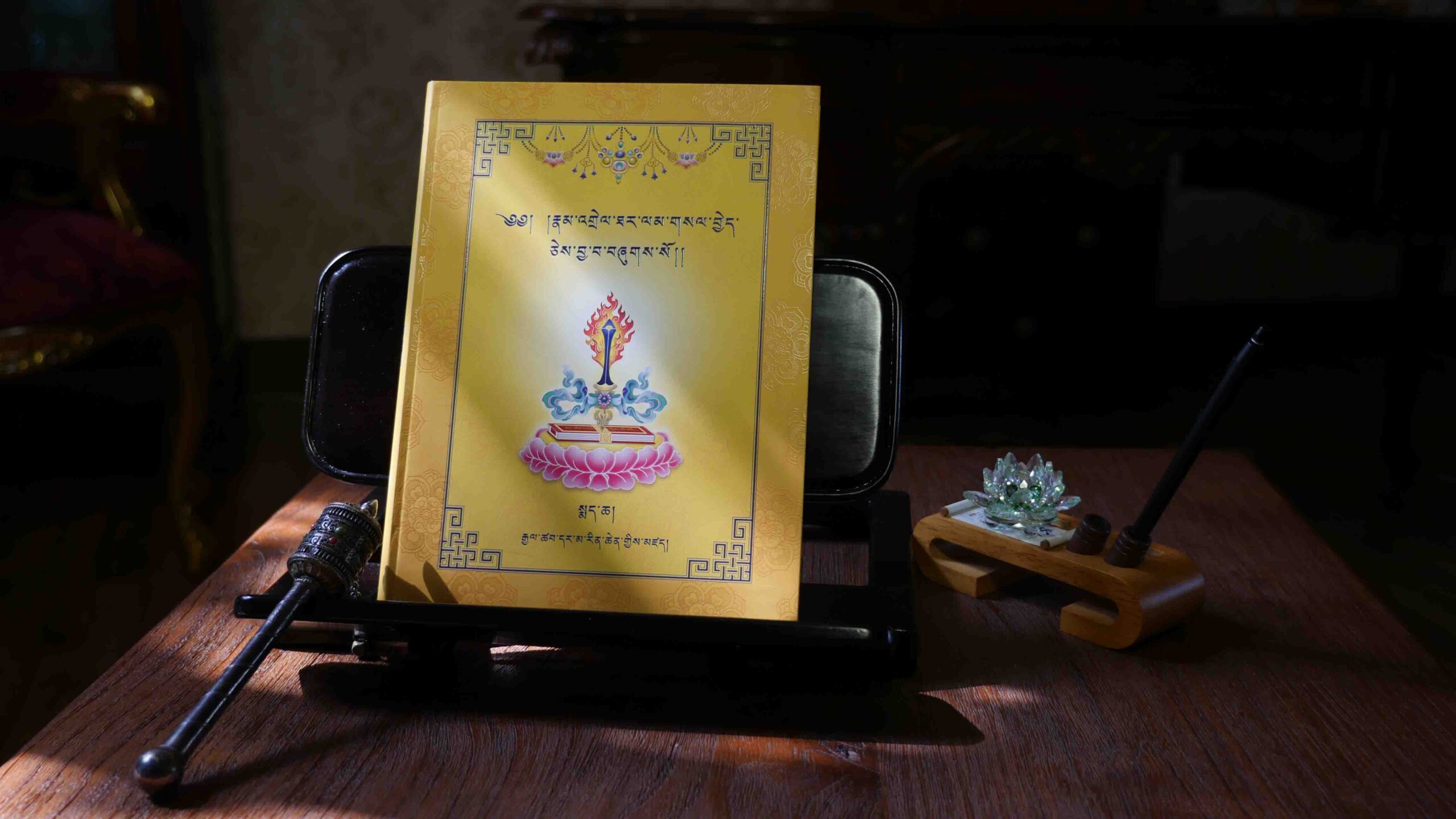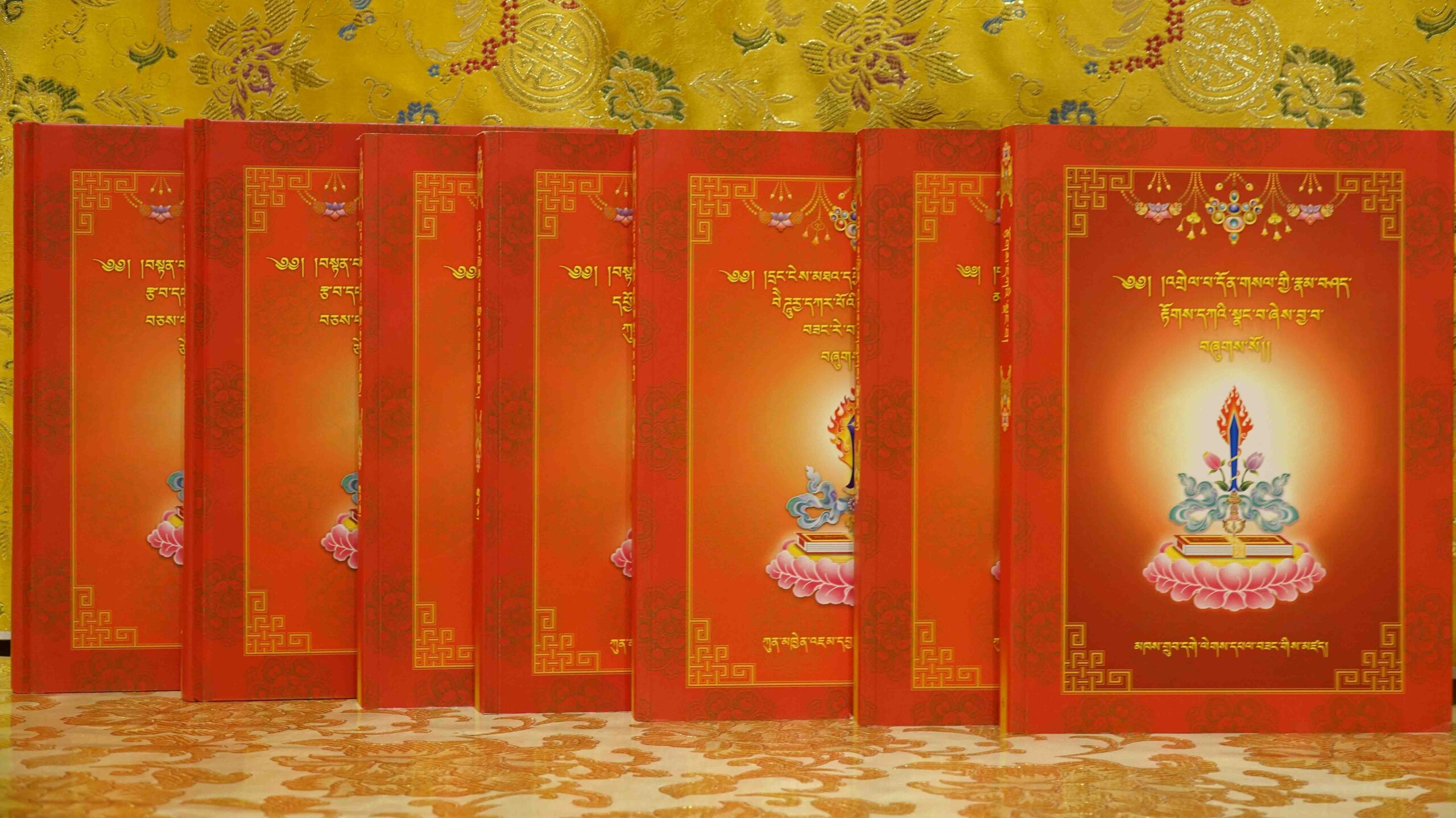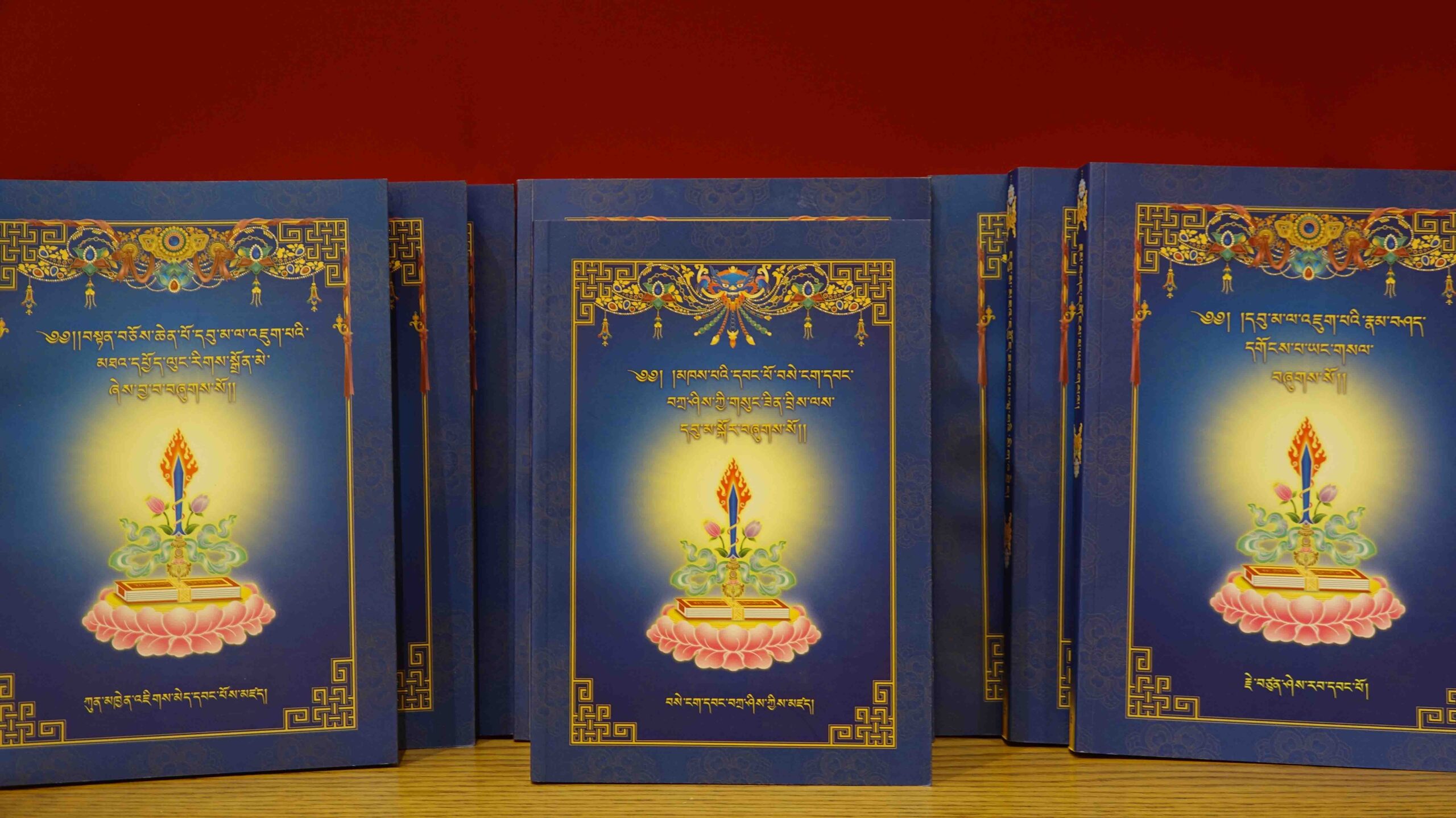Five Great Treatises
Five Great Treatises Overview
Cultivating Scholarly Excellence in Buddhist Philosophy
Great Wisdom is the only school in the Western society to offer the esteemed “Five Great Treatises” curriculum of Buddhist philosophy to women. The curriculum culminates in the recognition as a geshema, which is analogous to receiving a doctorate in the academic world. Great Wisdom currently offers diplomas to recognize successful completion of each academic level. We hope to eventually award academic degrees, and are currently understanding this process.
“Five Great Treatises” consists of rigorous study of five major sutras. At Great Wisdom, the curriculum is divided in three components: Logic and Scientific Inquiry, The Ornament of Clear Knowledge, and Advanced Studies.
Logic and Scientific Inquiry

Critical thinking is an important foundation of Buddhist study; through inquiry and logical reasoning, students are trained to ask questions and approach problems in innovative ways. The three courses within Logic and Scientific Inquiry–Collected Topics, Buddhist Logic, and Science of Mind, allow students to develop the foundations for sharp analytical and debate skills necessary for future studies.
| Course Title |
|---|
| FGT1101. Se’s Collected Topics—Basic Reasoning Skills I |
| FGT1102. Debate on Se’s Collected Topics—Basic Reasoning Skills I |
| FGT1103. Recitation on Se’s Collected Topics – Basic Reasoning Skills I |
| FGT1104. Se’s Collected Topics—Basic Reasoning Skills II |
| FGT1105. Debate on Se’s Collected Topics—Basic Reasoning Skills II |
| FGT1106. Recitation on Se’s Collected Topics—Basic Reasoning Skills II |
| FGT1107. Se’s Collected Topics—Intermediate Reasoning Skills I |
| FGT1108. Debate on Se’s Collected Topics—Intermediate Reasoning Skills I |
| FGT1109. Recitation on Se’s Collected Topics—Intermediate Reasoning Skills I |
| FGT1110. Se’s Collected Topics—Intermediate Reasoning Skills II |
| FGT1111. Debate on Se’s Collected Topics—Intermediate Reasoning Skills II |
| FGT1112. Recitation on Se’s Collected Topics—Intermediate Reasoning Skills II |
| FGT1113. Se’s Collected Topics—Advanced Logic Reasoning Skills |
| FGT1114. Debate on Se’s Collected Topics— Advanced Logic Reasoning Skills |
| FGT1115. Recitation on Se’s Collected Topics— Advanced Logic Reasoning Skills |
| FGT1201. Jamyang Zhépa’s The Analysis on Buddhist Logic I | FGT1202. Se’s The Analysis on Buddhist Logic I | FGT1203. Debate on Jamyang Zhépa’s the Analysis on Buddhist Logic I; Se’s the Analysis on Buddhist Logic I | FGT1204. Recitation on Jamyang Zhépa’s the Analysis on Buddhist Logic I; Se’s the Analysis on Buddhist Logic I | FGT1205. Jamyang Zhépa’s The Analysis on Buddhist Logic II | FGT1206. Se’s The Analysis on Buddhist Logic II | FGT1207. Debate on Jamyang Zhépa’s The Analysis on Buddhist Logic II; Se’s the Analysis on Buddhist Logic II | FGT1208. Recitation on Jamyang Zhépa’s The Analysis on Buddhist Logic II; Se’s the Analysis on Buddhist Logic II | FGT1209. Jamyang Zhépa’s The Analysis on Science of Mind | FGT1210. Debate on Jamyang Zhépa’s The Analysis on Science of Mind | FGT1211. Recitation on Jamyang Zhépa’s The Analysis on Science of Mind |
The Ornament of Clear Knowledge

Discover Maitreya’s “Five Great Treatises,” our cornerstone curriculum at Great Wisdom. Authored by the revered Buddhist master, these teachings offer a roadmap to enlightenment—a state of complete wisdom combined with infinite compassion. Students explore each stage of the journey, cultivating compassion and wisdom, and embracing selfless dedication. Supplemental materials deepen understanding of this timeless scripture.
| Course Title |
|---|
| FGT1301. A Commentary on the Seventy Topics; A Garland of Philosophies |
| FGT1302. Debate on A Commentary on the Seventy Topics; A Garland of Philosophies |
| FGT1303. Recitation on Ornament of Clear Knowledge I |
| FGT1304. Ornament of Clear Knowledge I |
| FGT1305. Debate on Explanation and Analysis of Ornament of Clear Knowledge I; Annotations on Chapter One of Ornament of Clear Knowledge I |
| FGT1306. Recitation on Ornament of Clear Knowledge II |
| FGT1307. Ornament of Clear Knowledge II |
| FGT1308. Debate on Explanation and Analysis of Ornament of Clear Knowledge II; Annotations on Chapter One of Ornament of Clear Knowledge II |
| FGT1309. Recitation on Ornament of Clear Knowledge III |
| FGT1310. Ornament of Clear Knowledge III |
| FGT1311. Debate on Explanation and Analysis of Ornament of Clear Knowledge II; Annotations on Chapter One of Ornament of Clear Knowledge II; The Twenty Practitioners |
| FGT1312. Recitation on Ornament of Clear Knowledge IV |
| FGT1313. Ornament of Clear Knowledge IV |
| FGT1314. Debate on Explanation and Analysis of Ornament of Clear Knowledge Ⅳ; Annotations on Chapter One of Ornament of Clear Knowledge Ⅳ |
| FGT1315. Recitation on Ornament of Clear Knowledge V |
| FGT1316. Twelve Dependent Arisings | FGT1317. Debate on A Detailed Explanation of the Twelve Dependent Arisings | FGT1318. Recitation on Ornament of Clear Knowledge VI | FGT1319. Ornament of Clear Knowledge V | FGT1320. Debate on Explanation and Analysis of Ornament of Clear Knowledge Ⅴ; Annotations on Chapter One of Ornament of Clear Knowledge Ⅴ | FGT1321. Recitation on Ornament of Clear Knowledge VII | FGT1322. Fundamental Consciousness | FFGT1323. Debate on Key Difficult Points Regarding the Fundamental Consciousness | FGT1324. Recitation on Ornament of Clear Knowledge VIII | FGT1325. Ornament of Clear Knowledge VI | FGT1326. Debate on Explanation and Analysis of Ornament of Clear Knowledge VI | FGT1327. Recitation on Ornament of Clear Knowledge IX | FGT1328. Essence of True Eloquence | FGT1329. Debate on Essence of Eloquence: Differentiating Interpretable and Definitive Meanings | FGT1330. Recitation on Ornament of Clear Knowledge X | FGT1331. Ornament of Clear Knowledge VII | FGT1332. Debate on Explanation and Analysis of Ornament of Clear Knowledge VII | FGT1333. Recitation on Ornament of Clear Knowledge XI | FGT1334. Form and Non-Form | FGT1335. Debate on “Form and Non-Form” | FGT1336. Recitation on Ornament of Clear Knowledge XII |
Advanced Studies

Unlock your fullest potential by delving into the mysteries of the mind in our Advanced Studies program. Explore life’s realities, the universe’s evolution, and Buddhist moral disciplines across three transformative courses: Entering the Middle Way, Treasury of Higher Knowledge, and Compendium of Discipline. Dive into the concept of emptiness, gain insight into the universe’s phenomena, and analyze Buddhist monastic precepts for a profound understanding of self and existence.
| Course Title |
|---|
| FGT1401. The Great Middle Way I |
| FGT1402. Debate on The Great Middle Way I |
| FGT1403. Recitation on The Great Middle Way I |
| FGT1404. The Great Middle Way II |
| FGT1405. Debate on The Great Middle Way II |
| FGT1406. Recitation on The Great Middle Way II |
| FGT1407. The Great Middle Way III |
| FGT1408. Debate on The Great Middle Way III |
| FGT1409. Recitation on The Great Middle Way III |
| FGT1410. The Great Middle Way IV |
| FGT1411. Debate on The Great Middle Way IV |
| FGT1412. Recitation on The Great Middle Way IV |
| FGT1501. Verses on The Treasury of Higher Knowledge I |
| FGT1502. Verses on Comparison of the Schools of Philosophy I |
| FGT1503. Debate on Verses on The Treasury of Higher Knowledge I; Verses on Comparison of the Schools of Philosophy I | FGT1504. Recitation on Verses on The Treasury of Higher Knowledge I | FGT1505. Verses on The Treasury of Higher Knowledge II | FGT1506. Verses on Comparison of the Schools of Philosophy II | FGT1507. Debate on Verses on The Treasury of Higher Knowledge II; Verses on Comparison of the Schools of Philosophy II | FGT1508. Recitation on Verses on The Treasury of Higher Knowledge II | FGT1509. Verses on The Treasury of Higher Knowledge III; Verses on Comparison of the Schools of Philosophy III | FGT1510. Debate on Verses on The Treasury of Higher Knowledge III; Verses on Comparison of the Schools of Philosophy III | FGT1511. Recitation on Verses on The Treasury of Higher Knowledge III | FGT1601. Verses on Compendium of Discipline I | FGT1602. Debate on Verses on Compendium of Discipline I | FGT1603. Recitation on Verses on Compendium of Discipline I | FGT1604. Verses on Compendium of Discipline II | FGT1605. Debate on Verses on Compendium of Discipline II | FGT1606. Recitation on Verses on Compendium of Discipline II | FGT1607. Verses on Compendium of Discipline III | FGT1608. Debate on Verses on Compendium of Discipline III | FGT1609. Recitation on Verses on Compendium of Discipline III |
| Course Title |
|---|
| FGT2101. Ra’s Collected Topics of Epistemology |
| FGT2102. Se’s Collected Topics of Epistemology |
| FGT2103. A Key for the Machine of Logic |
| FGT2104. An Eloquent Presentation of The Collected Topics of Buddhist Logic |
| FGT2105. The Collected Topics of Epistemology—Advanced |
| FGT2201. An Extensive Commentary to “The Detailed Commentary upon Valid Perception” |
| FGT2202. Jewel of Reasoning: Commentary on Valid Perception |
| FGT2203. Clearing the Darkness of the Mind: Jewel of the Seven Works on Valid Perception |
| FGT2204. Collection of Works by Tsongkhapa and his Main Disciples on Logical Reasoning |
| FGT2301. Meaning of Illumination: An Explanation |
| FGT2302. Annotations of Illumination of the Path to Freedom |
| FGT2303. The Golden Garland |
| FGT2304. The Jewel of the Essence of the Explication |
| FGT2305. Se’s Notes on The Ornament of Clear Knowledge |
| FGT2306. Essence of Eloquence: Differentiating Interpretable and Definitive Meanings |
| FGT2307. Commentary on the Difficult Points of “Essence of Eloquence” |
| FGT2308. Annotations on Essence of Eloquence | FGT2309. Annotations on Mind-Only within Essence of Eloquence | FGT2310. An Explanation of Comparative Philosophies of Varying Schools of Thought | FGT2311. A Goldmine of Dependent Origination Teachings | FGT2312. A Compilation of Key Works Written by Tsongkhapa | FGT2313. Verse Summary of the Fourth Chapter | FGT2314. Jamyang Zhépa’s Establishment of Meditation | FGT2401. Illumination of the Difficult Teachings: Commentary on “Meaning Clarified” | FGT2501. Mchims’ Commentary to the “Treasury of Higher Knowledge” | FGT2601. A Garland of Philosophies | FGT2701. The Golden Garland Seminar I | FGT2702. The Golden Garland Seminar II | FGT2703. The Golden Garland Seminar III | FGT2704. The Golden Garland Seminar IV | FGT2705. Meditative Concentration Seminar I | FGT2706. Meditative Concentration Seminar II | FGT2707. The Great Middle Way Seminar I | FGT2708. The Great Middle Way Seminar II | FGT2709. The Great Middle Way Seminar III |
At Great Wisdom, students internalize materials from “Five Great Treatises” through two primary methods:
Buddhist debate and memorization.

Buddhist Debate
Debate is an intellectual tradition that traces back to the 5th century. Unique to Buddhist debate is its purpose. The goal is not to defeat the opponent. Rather, it is an exploration of truth. Buddha himself taught us to scrutinize his words and make our own conclusions. Debate serves this purpose. It is a powerful learning tool, strengthening analytical skills and sharpening the clarity of mind. It also trains us to recognize our own misconceptions and contradictions so we can effectively overcome our mental hurdles. Within the “Five Great Treatises” program, students practice debate throughout the introductory, intermediate, and advanced programs.

Memorization
Historically, memorization has been foundational in Buddhist education. It served as a form of learning, but was also critical in the oral tradition of passing down Buddhist texts. However, within our modern age, memorization is not obsolete. Science has shown that memorization is important for a multitude of cognitive functions, such as learning, focus, and, of course, memory. And within the process of learning, memorization is a critical first step━the more factual knowledge we have, the better we can think about it critically and analytically. Memorization is a core part of “Five Great Treatises” as students memorize throughout the 15-year years of study. Students memorize an average of 15,000-20,000 words each year.
